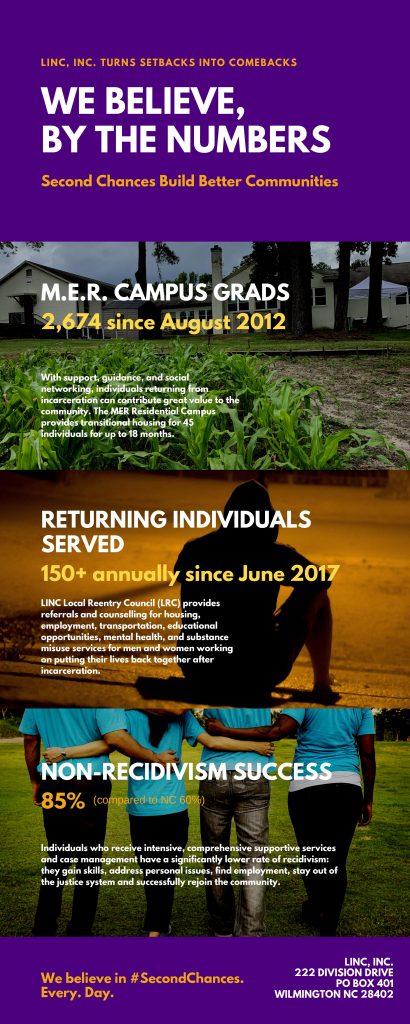Second Chances By the Numbers
LINC, Inc. backs up the successful strategy of facilitating second chances with powerful individual stories of overcoming the obstacles of incarceration and justice system-involvement. Statistics also illustrate the success of positive, supportive reentry services.

MER Campus Graduate Successes
At LINC, Inc., we believe that directed support, guidance, and social networking, individuals returning from incarceration can contribute great value to the community. They can find and hold jobs, continue their education, become part of their families, and become positive members of their neighborhoods.
Since it opened, MER Transitional Living Campus has graduated 2674 men and women.
The MER Residential Campus, which opened in 2012, provides transitional housing for 45 individuals – 25 men and 20 women – for up to 18 months each. The average time of residence at MER is from six to twelve months.
Local Reentry Council Serving Returning Citizens
The LINC Local Reentry Council (LRC) began serving individuals returning from incarceration in 2017. LINC LRC staff provide referrals and counselling for housing, employment, transportation, educational opportunities, mental health, and substance misuse services. At LINC, LRC case workers assist more than 150 individuals a year, with multiple counseling sessions per person, and long-term supportive counseling.
Men and women working on putting their lives back together after incarceration face an incredible number of challenges, from obtaining a legal I.D. and reinstating a driver’s license, to finding a place to live and navigating new technology. LRC case workers are available to help people navigate what often seem like insurmountable obstacles.
Laudable Non-recidivism Rates
Supportive reentry works. The numbers prove it: LINC, Inc. annually achieves non-recidivism rates of 85% or better.
That means that only 15% of the MER Residents and LRC clients have subsequent justice-system involvement.
The North Carolina three-year non-recidivism rate is 60%; what LINC, Inc. does, works.
Supportive case management helps individuals get on track, and turn their personal setbacks into comebacks that matter. By helping manage the interface between parole officers and formerly incarcerated individuals, LINC, Inc. reduces justice-system involvement. Caring, non-judgemental caseworkers help find resources, solve problems, connect individuals with the services and health care needed, and start rebuilding self-worth and positivity.
Supportive reentry saves lives.
